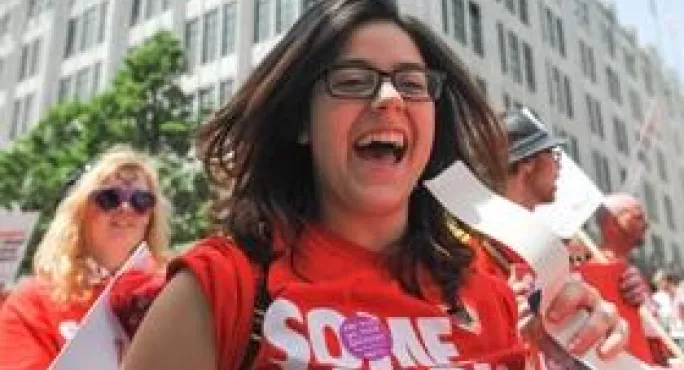Gay teachers less likely to challenge homophobia

Gay and lesbian teachers are less likely than their heterosexual colleagues to discipline students when they witness homophobic bullying at school, for fear of drawing attention to their sexuality and putting their careers at risk, research has revealed.
Teachers who are lesbian, gay, bisexual or transgendered (LGBT) are also scared to intervene when they hear homophobic language, including when children use the word “gay” as a term of abuse.
“Often, LGBT educators are less likely to say something in response to homophobia, because then they might be perceived as gay,” said Tiffany Wright from Millersville University in Pennsylvania, US, who carried out the research. “They’re fearful for their job, or fearful of the repercussions of being seen as gay.”
Dr Wright carried out in-depth interviews with more than 350 teachers and principals about how they deal with incidents of homophobia at school.
Many interviewees admitted that they did not feel safe coming out as gay at school. Two-thirds said that they rarely or never see another teacher intervene when homophobic remarks are made in the staffroom. And 59 per cent said that they had heard homophobic comments made by other teachers.
Around half of gay teachers said that they did not always challenge homophobic language used by students.
The research on homophobia in American schools follows extensive campaigns in the UK by gay rights charities to stamp out homophobia among young people. However, relatively small numbers of teachers come out at school for fear of a negative reaction. School leaders are particularly reluctant to reveal their homosexuality.
Dr Wright said that more than a third of the teachers she interviewed were worried that their jobs would be at risk if they drew attention to their sexuality and came out to other teachers at school. In addition, 62 per cent worried about losing their jobs if they came out to students. More than half said that they almost never felt comfortable being out when they interacted with parents.
“A lot of folks, theoretically, might be in favour of gay marriage and have liberal views,” Dr Wright said. “But when you’re talking about their kids, that’s a little different. Then, suddenly, people’s prejudices come out.”
Sue Sanders, co-chair of UK-based LGBT teachers’ association Schools Out, said there is a widespread assumption that if teachers challenge homophobia, they are “outing” themselves.
“When a straight person tackles homophobia, the assumption is that they’re gay,” she said. ”[But] when you’re a member of a minority group, you’re aware that you’re seeing stuff that people who aren’t members of that minority group might not see.
“You see it around women challenging sexism or black people challenging racism. There’s a fear that people will say that, just because you’re lesbian or gay, you think everyone’s against you.”
Dr Wright’s research paper cites an example from her own teaching career, when - in front of students - a fellow teacher used the phrase “this is so gay” to mean “this is so stupid”.
“We grew up in an era when gay equalled bad,” Dr Wright said. “That’s so ingrained in so many people. We’ve made a lot of progress since then, but the language has just been pervasive.”
Earlier this month, England’s education secretary Michael Gove drew attention to the continued use of “gay” as a playground insult, calling it “outrageous and medieval”.
Wes Streeting, head of education at British gay rights lobbying group Stonewall, said: “Homophobic bullying is much more prevalent in schools where teachers don’t challenge homophobic language. If the teachers themselves are using such language, goodness knows what the effect would be on gay pupils.”
Professor Ian Rivers, who researches homophobic bullying for Brunel University in London, said that school leaders often expect openly gay teachers to lead classroom discussions about sexual orientation.
“This is actually where headteachers are missing a trick,” he said. “They need stereotypically heterosexual teachers to engage with these issues - show that it’s unacceptable for anyone to display any kind of homophobia.”
“Any kid can get called gay,” Professor Rivers added. “If they’re good at something, if they’re bad at something. If they’re a bit different. It doesn’t matter.
“It’s the one abusive term where it’s very difficult to demonstrate that you’re not. How do you demonstrate that you’re not gay?”
Photo credit: Alamy
Keep reading for just £1 per month
You've reached your limit of free articles this month. Subscribe for £1 per month for three months and get:
- Unlimited access to all Tes magazine content
- Exclusive subscriber-only stories
- Award-winning email newsletters



